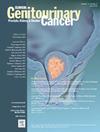吉西他滨和卡铂在不适合顺铂治疗的转移性尿路上皮癌患者中的剂量评价。
IF 2.3
3区 医学
Q3 ONCOLOGY
引用次数: 0
摘要
背景:国家综合癌症网络膀胱癌指南推荐卡铂和吉西他滨一线治疗顺铂不合格的转移性尿路上皮癌(mUC)患者,这是1类推荐。这些患者的中位总生存期为9.3个月。虽然卡铂的副作用被认为是可以忍受的,但许多患者仍然需要减少剂量、延迟剂量和住院治疗。鉴于mUC患者无法耐受这种姑息治疗方案,我们的目标是确定以较低剂量方案开始治疗是否合理。方法:对2014年5月至2022年10月期间接受卡铂加吉西他滨治疗的符合条件的患者进行单机构回顾性分析。通过手工图表回顾收集的数据包括患者基线特征、化疗剂量、减量、延迟、毒性和有效性。结果:43例患者符合纳入标准。19名患者(44%)在治疗期间需要减少≥1次剂量。26名患者(60%)开始采用全剂量方案,其中14名患者(54%)在治疗期间需要减少剂量。17名患者(40%)以减剂量方案开始,其中5名患者(29%)在治疗期间需要减剂量。没有患者在全剂量下接受预期的6个周期,但14%的患者在减少剂量的情况下完成了6个周期。1例患者(2%)能够耐受卡铂和吉西他滨相对剂量强度的80%。结论:不适合顺铂治疗的mUC患者不能耐受全剂量的卡铂和吉西他滨。由于这是一种姑息治疗方案,因此考虑以减少剂量开始治疗以尽量减少治疗中断,剂量遗漏和副作用是相关的。本文章由计算机程序翻译,如有差异,请以英文原文为准。
Evaluation of Gemcitabine and Carboplatin Dosing in Patients With Cisplatin-Ineligible Metastatic Urothelial Carcinoma
Background
The National Comprehensive Cancer Network Bladder Cancer Guidelines recommend carboplatin and gemcitabine first-line treatment in patients with cisplatin-ineligible, metastatic urothelial cancer (mUC) -- a Category 1 recommendation. For these patients, the median overall survival is 9.3 months. While carboplatin is purported to offer a more tolerable side-effect profile, many patients still require dose-reductions, dose-delays, and hospitalizations. Given the inability for mUC patients to tolerate this palliative regimen, we aim to determine whether initiating therapy with a lower dose regimen is justified.
Methods
A single-institution retrospective analysis was conducted to review eligible patients treated with carboplatin plus gemcitabine from May 2014 through October 2022. Data collected via manual chart review included patient baseline characteristics, chemotherapy doses, reductions, delays, toxicities, and effectiveness.
Results
Forty-three patients met inclusion criteria. Nineteen patients (44%) required ≥ 1 dose reduction during therapy. Twenty-six patients (60%) started with a full-dose regimen, and 14 (54%) of those patients required a dose reduction during treatment. Seventeen patients (40%) started with a reduced-dose regimen, and 5 (29%) of those patients required a dose reduction during treatment. No patients received the anticipated 6 cycles at full dose, but 14% completed 6 cycles with dose reductions. One patient (2%) was able to tolerate >80% relative dose intensity of both carboplatin and gemcitabine.
Conclusions
Cisplatin-ineligible mUC patients were unable to tolerate full-dose carboplatin and gemcitabine. As this is a palliative regimen, it would be pertinent to consider starting therapy at a reduced dose to minimize treatment interruptions, dose omissions and side effects.
求助全文
通过发布文献求助,成功后即可免费获取论文全文。
去求助
来源期刊

Clinical genitourinary cancer
医学-泌尿学与肾脏学
CiteScore
5.20
自引率
6.20%
发文量
201
审稿时长
54 days
期刊介绍:
Clinical Genitourinary Cancer is a peer-reviewed journal that publishes original articles describing various aspects of clinical and translational research in genitourinary cancers. Clinical Genitourinary Cancer is devoted to articles on detection, diagnosis, prevention, and treatment of genitourinary cancers. The main emphasis is on recent scientific developments in all areas related to genitourinary malignancies. Specific areas of interest include clinical research and mechanistic approaches; drug sensitivity and resistance; gene and antisense therapy; pathology, markers, and prognostic indicators; chemoprevention strategies; multimodality therapy; and integration of various approaches.
 求助内容:
求助内容: 应助结果提醒方式:
应助结果提醒方式:


